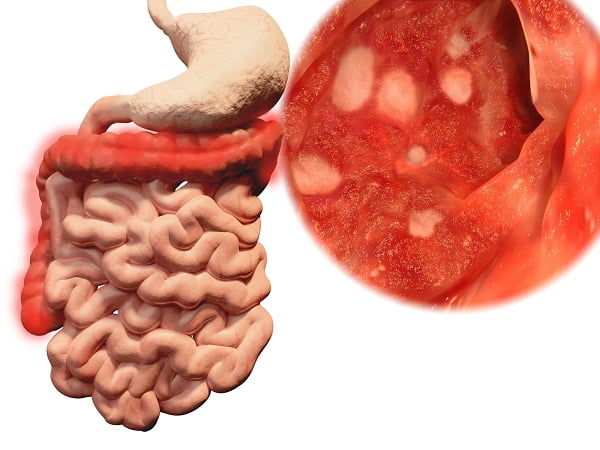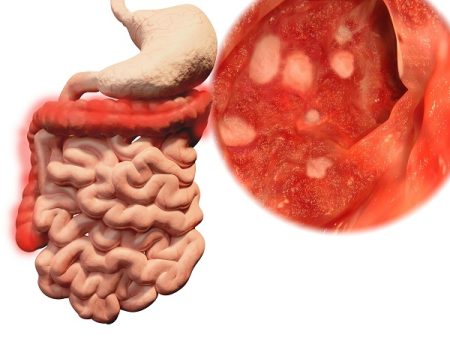Ulcerative Colitis: Causes, Symptoms, Diagnosis, Treatment
- Updated on: Jul 29, 2024
- 5 min Read
- Published on Feb 27, 2021

What is ulcerative colitis?
Ulcerative Colitis is the most common type of inflammatory bowel disease. It is a chronic disease in which the inner lining of large intestine experiences inflammation and ulcers which results in severe abdominal pain, bleeding and many other symptoms.
Ulcerative colitis occurs in colon and rectum part of the large intestine. Due to constant inflammation, the intestinal bowel starts emptying its contents frequently causing the cells on the lining of colon to die. These died cells forms small sores, known as ulcers that causes pain in the abdomen and can even result in mucus discharge along with blood.
What are the different types of ulcerative colitis?
There are 5 different types of ulcerative colitis classified on the basis of its location. They are-
Proctosigmoiditis
Sigmoid colon is the lower end of the colon that connects the colon to rectum. Proctosigmoiditis is a type of ulcerative colitis in which inflammation occurs in the area near rectum (anus). It can result in the symptoms such as abdominal pain, bloody diarrhea, etc.
Ulcerative proctitis
Ulcerative proctitis is the mildest type of ulcerative colitis in which inflammation occurs in the area near rectum. The most widely studied symptom of ulcerative proctitis is bleeding of rectum.
Left-sided colitis
In left-sided colitis, inflammation spreads from rectum to colon through sigmoid colon. The most common symptoms are abdominal cramps on the left side, bloody diarrhea, weight loss, etc.
Pancolitis
Pancolitis usually affects whole colon and causes severe abdominal pain, major weight loss, bloody diarrhea, etc.
Acute severe ulcerative colitis
Acute severe ulcerative colitis is the rare type of colitis which adversely affects the entire colon. It results in symptoms such as, severe abdominal cramps and pain, heavy bleeding, fever, profuse diarrhea, weight loss, inability to eat, etc.
What causes ulcerative colitis?
Ulcerative colitis is a chronic disease of large intestine. The exact cause of this condition is still unknown. However, scientists believe that ulcerative colitis occurs as a result of abnormal activation of the immune system in the intestine. The immune system defends the body from harmful agents such as bacteria, viruses, fungi etc, and is activated when the body is exposed to harmful foreign invaders.
In case of patients suffering from ulcerative colitis, the immune system is abnormally activated in the absence of invaders. The continuous response of abnormally activated immune system results in the inflammation and ulceration of the large intestine. This condition of immune system is genetically inherited and can pass from one generation to other.
What are the risk factors of ulcerative colitis?
Although, ulcerative colitis is a genetically inherited disease, still people with no family history might have it. There are certain risk factors that can trigger the chances of having ulcerative colitis. Some major factors are as follows:-
Age
Ulcerative colitis can occur in people of any age but it usually begins nearly at the age of 30. It is possible that the person might not get the disease even at the age of 60.
Family history
If any family member is suffering from ulcerative colitis, then there is a high chance of the person getting it as well.
Race or ethnicity
Ulcerative colitis usually occurs in whites but it can happen to anyone of any race. However, people belonging to Ashkenazi Jewish descent are at a higher risk of having the disease.
What are the symptoms of ulcerative colitis?
There are many symptoms associated with ulcerative colitis. These symptoms range from mild to severe. The symptoms may vary from person to person, part of the intestine inflamed, etc.
Some major symptoms observed in ulcerative colitis are:-
- Pain and cramps in abdomen
- Significant weight loss
- Constant fever
- Pus or blood in stool
- Recurring diarrhea
- Reduced appetite
- Problem in defecate
These are some major symptoms that are commonly observed in patients of ulcerative colitis. These symptoms can range from mild to severe.
How can ulcerative colitis be diagnosed?
Ulcerative colitis is usually diagnosed based on the symptoms experienced by the patient. Although there is no specific technique for the diagnosis, there are some tests that can be used to diagnose the disease. Some tests are-
Blood Test
Blood test is the most common type of diagnostic test performed to diagnose ulcerative colitis. Blood test is done to check the patient for conditions like anemia or to check the white blood cells count. An increased white blood cell count reflects the progressing immune response in the intestine.
Stool Test
Patients with ulcerative colitis have large number of white blood cells in their stool. So, a stool test is performed in order to detect the presence of the cells in the stool. Stool test can also be used to detect the cause of infection.
Colonoscopy
Colonoscopy is a diagnostic technique by which the doctor can view the entire colon with the help of a thin and flexible lighted tube attached with a camera. By this, the exact status of ulcerative colonoscopy can be known. While doing colonoscopy, the doctor may even take some tissue samples for diagnosis. This is known as tissue biopsy.
CT scan
The doctor can suggest the patient to undergo CT scan if he suspects some major complication occurring as a result of ulcerative colitis. CT scan can also tell the exact status of the inflamed colon.
Flexible sigmoidoscopy
Flexible sigmoidoscopy is a thin, flexible, lighted tube that is used to examine the rectum and sigmoid colon. If the colon is severely inflamed then the doctor may use this technique to check colon.
Computerized tomography (CT) enterography and magnetic resonance (MR) enterography
These tests are much more sensitive in detecting any inflammation in the bowel than all the above tests. Magnetic resonance enterography is a non radiation diagnostic test.
How is ulcerative colitis treated?
All people are affected by ulcerative colitis differently. Therefore, various treatment options are followed on the basis of different symptoms.
Over-the-counter medicine
In case of mild symptoms, over the counter medicines are prescribed to treat the patients with ulcerative colitis. Some medicines prescribed by the doctors are as follows:-
Antibiotics
Antibiotics such as metronidazole, ciprofloxacin, etc are used to treat infections and other complications of ulcerative colitis.
5-ASAs (Aminosalicylates)
These medications are given either orally or rectally to decrease the inflammation in the inner lining of the intestine.
Corticosteroids
Corticosteroids are either given orally, as an injection or intravenously to the ulcerative colitis patients. These medicines help to control inflammations by suppressing the immune system.
Biologics (Biologic therapies)
These medicines help in suppressing the immune system and thus reduce the inflammation by targeting a specific pathway.
Read about medication for ulcerative colitis.
Surgery
There are various surgical methods that are used to treat ulcerative colitis. Surgery is usually done when the treatment with medicines is not enough to properly treat the disease. To treat ulcerative colitis, the colon and the rectum are surgically removed from the body and a new pathway is created for the waste to be excreted. This procedure is known as proctocolectomy.
There are three variations of proctocolectomy:
- Total proctocolectomy with end ileostomy: In this procedure, the anus is also removed along with the colon and rectum and a hole is created in abdomen, called stoma, from where the waste can be excreted in a pouch.
- Proctocolectomy with ileal pouch-anal anastomosis (IPAA): In this case, the colon and the rectum are removed but the anus and the sphincter muscles are not removed.
How can ulcerative colitis be prevented?
Ulcerative colitis is a chronic disease that is hard to live with. People who suffer from ulcerative colitis for more than 8 years, are at a higher risk of having colon cancer. So, it is very important to get the proper treatment as soon as possible.
Although there is no record of the specific food that causes the disease, but a simple change in food habits and lifestyle can help in controlling the symptoms and living a healthy life.
- Many people suffering from ulcerative colitis find it difficult to digest dairy products. In order to control diarrhea and abdominal pain, the use of dairy products should be minimized.
- Intake of fluids should be increased, especially of water. Alcoholic beverages should be eliminated as it increases the inflammation of bowel.
- Frequent small meals should be taken as it constantly maintains the action of digestive system.
- Low fiber food should be preferred as it is easily digestible.
- Regular exercise helps in reducing stress and normalizing the bowel movement thus reducing inflammation.
Read about Foods to Avoid With Ulcerative Colitis.
What are the complications associated with ulcerative colitis?
The most prevalent complication associated with ulcerative colitis is colon cancer. There are very high chances for a person to develop colon cancer if he or she is suffering from ulcerative colitis for a long time.
Some other complications of ulcerative colitis are as follows:
- Kidney stones
- Skin, joints, and eyes inflammation
- Severe dehydration
- Thickening of the intestinal wall
- Intestinal bleeding











